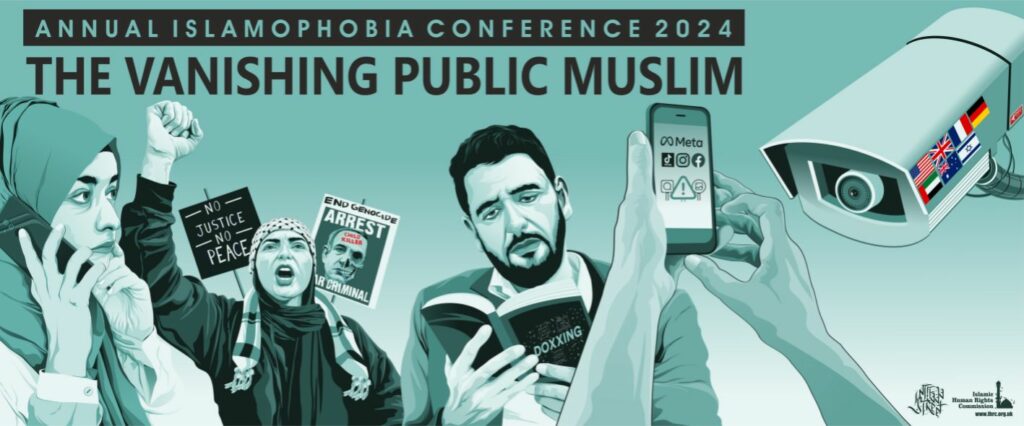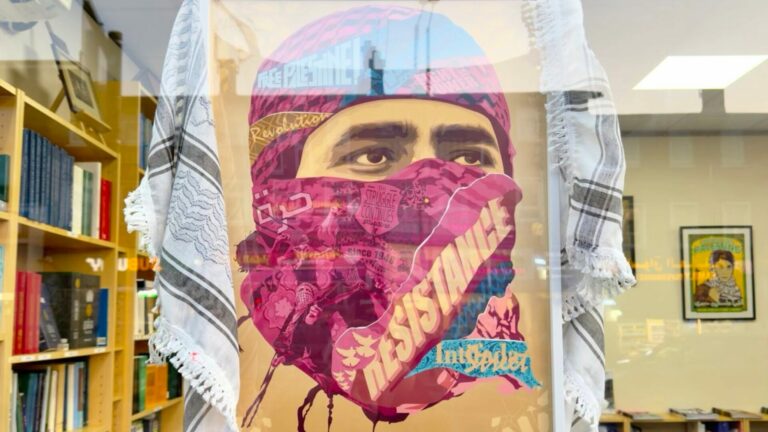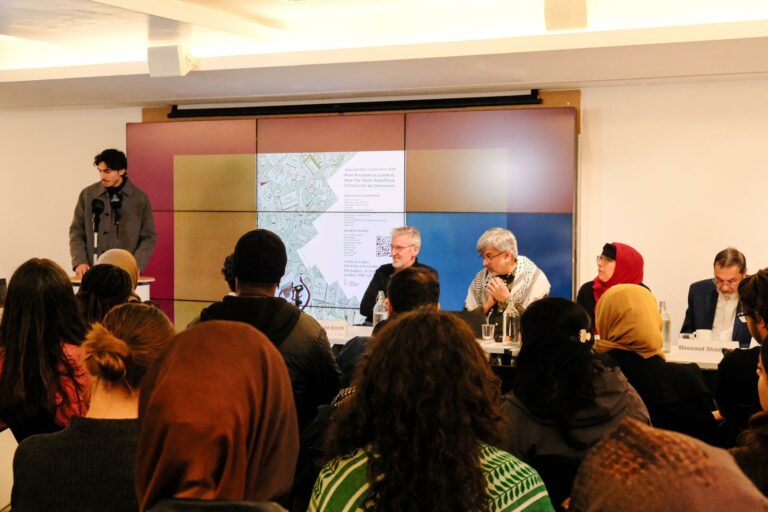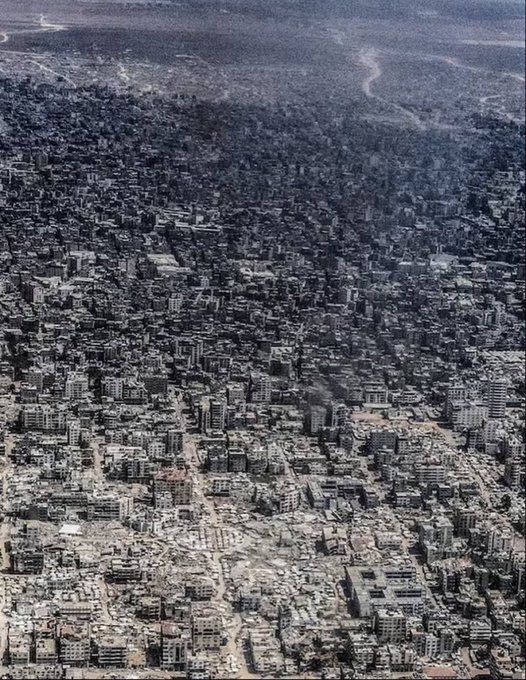IHRC held the 11th annual Islamophobia Conference on Saturday, 14 and Sunday, 15 December 2024. Entitled, The Vanishing Public Muslim, the focus of the conference was what it means for Muslims when they exercise their rights, particularly those in the Western hemisphere and claim to be liberal democracies, especially in light of what has transpired in Gaza, Palestine.
Professor Saeed Khan’s paper, Islamophobia and The Vanishing Public Muslim, provides the background to the discussions. It can be read here.
Day one of the conference (Saturday, 14) took place online and day two was a hybrid event, online and in-person at the P21 Gallery in Euston.
Watch Day One here:
Quotes have been slightly edited for better readability.
Professor Saeed Khan introduced the conference and the theme of Islamophobia and the vanishing public Muslim:
“IHRC does incredible work and every year hosts a conference regarding Islamophobia, showing Islamophobia is not only a reality but unfortunately one that mutates and takes on many different dimensions every year.
Particularly in light of what has transpired in Gaza, Palestine, and other parts of the world, we are focusing on what it means for Muslims when they exercise their rights, chiefly those in the Western hemisphere and claim to be liberal democracies… especially when it comes to the suppression of their form of expression… [such as] bringing attention to calling out injustice, protesting and dissenting what their respective governments do, in the same way their respective counterparts in society are able to do.
Is there something that is unique about either Muslims or those who try to champion Muslim causes that shows there is in fact a limitation, restriction and suppression of these views? The evidence is certainly there for us to then examine that this is not simply a delusion or paranoia, but it is steeped in reality.
As we view the last 14 months, we have the consider the various ways that Muslims and those who champion Muslim causes, have been restricted in what they say by two different dimensions of society: the public sector and government policy/legislation, the rhetoric of policymakers, and examining how the private sector has been involved, the corporate world, and other organisations and institutions within society.”
Saeed Khan mentions the ways in which this manifests in the US and Australia with efforts to dox and target individuals, as well as Britain, France, Germany, and India.
“Do western liberal democracies even care about upholding the values that they have historically used to define and distinguish themselves from other societies?”
Panel One: Global Policies of Silencing and Suppression
The first panel was chaired by Saeed Khan and the keynote speaker was Professor Anne Norton.
Professor Anne Norton commenced with thanking IHRC for the opportunity to speak against Islamophobia and for Palestine, and praising Saeed’s work and introduction into the topic. She examined how Islamophobia is most intensely manifested in the systemic genocide and erasure of Palestine, particularly Gaza, highlighting a pervasive “Palestine Exception” in the U.S., where freedom of expression and acknowledgment of Palestinian rights are routinely suppressed, Palestinians are silenced and delegitimised, and Israeli crimes are met with exculpatory silence.
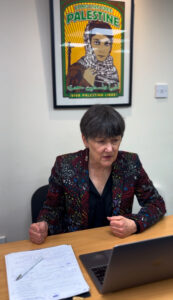
“I would argue that Islamophobia’s most virulent and visceral form at this point is visible genocide in Palestine and particularly in Gaza. The silencing of Palestine is so well-known in the U.S. that people in the media and often on the streets will refer to “the Palestine Exception.”
“The Palestine Exception” applies to freedom of speech, to academic freedom, and to freedom of expression altogether. When people speak of rights to freedom of expression, they speak of them as if they were accepted and inviolable, except when the issue is Palestine. Palestinians are rarely called on to speak and often ignored when they do. Palestinians are often the people whose name cannot be said. In wake of October 2023, while Palestinian casualties mounted, the President of my University (and too many others) wrote letter after letter mourning the Israeli dead while remaining silent on the dead of Palestine.
We should not be surprised by this. The silence on Palestine is so complete that Americans are told that there is no Palestine, that “Palestine” is an invented word (are not all words invented words?) of no great age. There are no Palestinians.
There is the long silence about Israeli’s crimes. The violation of one United Nations resolution after another, one massacre after another, and a long denial of basic human rights have remained in a well of exculpatory silence, even as settlements spread.
If you wear a keffiyeh, express support for Palestinians, you make yourself a target. Yet students and faculty and ordinary citizens did speak up. As their numbers increased, they spoke more loudly. They were told, we were told, we could not chant “From the river to the sea.” We could not say “intifada.” We could not speak at all, or carry signs, or wear keffiyehs, because those words made Jews uncomfortable. Their professed discomfort weighed more heavily to many -certainly to University administrators, but also to government officials- than the numbers of the dead.
We have good reason to doubt the protestations of University administrators that they had the welfare of Jewish students at heart. The many Jews among us saw that their words too could not be heard. They could not testify to tikkun olam or their own faith. They too could not speak, and if they spoke, they could not be heard. The alliance with Palestine silenced them as well. Their words too “made Jews uncomfortable.” They were erased as Jews, silenced as Jews.
I have grown up with the Palestine Exception to free speech. I have heard Islamophobic slurs, the repressive demands made of Muslims to “denounce terrorism” or Hamas, or whatever Islamophobes demand. Yet I have never seen repression on this scale. Those older than me, old enough to remember the House Unamerican Activities Committee, tell me that the repression we see now is worse than any since McCarthy.
And yet, there are worse places one could be. Repression is harsher in Germany, Austria, France, Hungary and Switzerland. Some cities outlaw all demonstrations for Gaza and Palestine. Some schools forbid keffiyehs. Many forbid particular chants, not only “From the River to the Sea” but “Free Palestine” as if Palestinian freedom was itself anathema. Some cities send SWAT teams to break in the doors of houses in the dark before the dawn. This, as you may know, was what Vienna did to Professor Farid Hafez.”
Professor Norton later takes a poignant approach to Palestine and Palestinians and Israel’s devastation of Palestinian livelihood, through the senses:
“I hear that the olive oil was bitter this year, because the harvest was late. Is this the taste of grief? What is the taste of months-long hunger? What is the smell of gunfire? What is the smell of blood as it soaks into the dry earth? What is the smell of bodies trapped in the rubble? How heavy is the bag that holds parts of your daughter’s body? We sense only a portion of the suffering in Gaza. We do not often speak of the most visceral senses: of touch, of taste, and most profoundly of smell. Yet these are the senses that testify most profoundly to the myriad harms done to the living and the dead of Palestine. These are the senses that testify to the despoiling of the land of Palestine.
What is done when olive trees are cut down in anger? The living people are denied the olive’s food, shade, life, and beauty. Decades, centuries, are gone in a moment. The labour and care of generations is lost.
Palestinian politics, poetry, literature, bear witness to their belonging to and caring for the land. In the rubble, under bombardment, Palestinians practice this ethics of belonging, this respect for land and landedness.”
Panellists for the first session included Imam Dawud Walid and Sandew Hira.
Imam Dawud’s commentary on papers by Saeed Khan and Anne Norton highlighted the tangible connection between Islamophobia and Palestinian humanity.
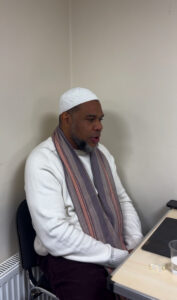
He focused primarily on America’s role in global Islamophobia and Palestinian dehumanisation in the American context.
As the Executive Director of the Michigan chapter of the Council on American-Islamic Relations, Imam Dawud shared that the past year has seen a record spike of civil rights cases since the inception of CAIR 30 years ago:
“In the past year, CAIR has received more civil rights complaints than even the year after 9/11 to put that into perspective… the resurgence of anti-Muslim hate. There was a huge spike after the renewing of the genocide of Palestinian people after Oct 7.
CAIR Michigan has one of the most densely concentration of Muslims and Arab-Americans. Michiganians reported cases of Islamophobia and bigotry were higher than the national average, despite Muslim representatives in the state. A lot of this has a direct connection to anti-Palestine rhetoric.”
Imam Dawud discusses two aspects of erasure of the negative effects on American Muslims as it relates to Palestine: the intentional erasure of Palestinian Christians and cultural imperialism.
“The intentional erasure of Palestinian Christians through the discourse. Despite Christians in Palestine and churches being bombed, in the diaspora, it is estimated to be between 6-11% of Palestinian diaspora is Christian – their erasure and silencing is a detriment for Palestinians and American Muslims in general. It is a deliberate silencing because it strips sensitivities of knowledge from Zionist and Evangelical Christians. White American Christians are the large percentage of Zionists in America. Making Palestinians and Muslims synonymous aids in the Zionist project.
When we speak about the issue of Palestine is only as an Islamic issue… but by not giving voice in highlighting Palestinian Christians, we actually unwittingly reinforce a framework that aids Islamophobia globally but particularly to American Muslims.
Anti-Palestinian sentiment is a primary driver of Islamophobia within the West; more so while there is a genocide currently going on. By totally focusing all on Palestine as the driver of Islamophobia even from a global perspective, ignores in my opinion or does not give a proper way to the more insidious form of Islamophobia creeping in from people who call themselves affiliated with the political left and how this relates to cultural imperialism.”
Imam Dawud explored U.S. military and cultural imperialism and efforts and outright hostility to marginalise traditional Islamic beliefs, especially from people on the left. As an example, he mentions talking points from the State Department of how the exporting of certain views on sexuality and gender being tied to giving foreign aid, to force western norms or western standards of family, family planning and sexuality on the Muslim world.
Sandew Hira analysed the silencing of Islamic and Muslim voices globally, emphasising its roots in a broader civilizational clash shaped by the dominance of Western enlightenment ideals, which prioritise secularism, individualism, and class-based ideologies like liberalism and Marxism.
He contrasted this with other civilizations—Islamic, Chinese, Latin American, African, and Indigenous communities—that integrate ethics, spirituality, and collective societal values and social justice, from a theological point of view as well. Hira argued that silencing Islamic perspectives stems from a refusal to engage with alternative civilizational frameworks from the Global South, framing this as both a political and civilizational challenge. He called for dialogue to replace clashes between Western progressivism and non-Western philosophies to envision new, inclusive paradigms. Hira also critiqued intersectionality as rooted in individualism for addressing global struggles like Gaza and Ukraine, proposing an anti-imperialist and decolonial approach connecting activists worldwide to resist Western hegemony and foster alternatives to mental and systemic colonialism.
“Moving forward we need to get engage with anti-imperialist forces within the West, within the global north but also the conversation between intellectuals and activists in the global South on how to build a universal civilisation and that is the counterweight for silencing Islamic and other voices from the global South because the voices of Islam should in the global north, be seen as one of the voices of the global South.”
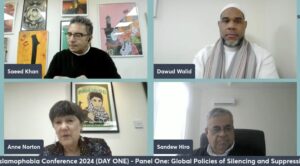
During the Q&A, discussions covered several themes including decoloniality, transnational activism, double consciousness and the white gaze, social justice in Shi’ite theology, hypocrisies in western secularism, the impact of economics, the limiting binaries of the west versus the rest, among other topics.
Panel Two: Institutional Silencing in Sociopolitical Contexts
This panel was chaired by Seyfeddin Kara, with keynote presentations from David Miller and Tasneem Chopra, and commentaries from Reverend Stephen Sizer and Richard Haley.
David Miller addressed the issue of institutional silencing, framing it as a subset of broader systemic challenges, including Islamophobia, genocide, and imperialism, all led by the U.S. He highlights that the fight against silencing cannot rely solely on abstract principles of free speech or academic freedom, as these ideals are often weaponised by powerful entities to maintain control.
“I think we should be thinking about what I would call full spectrum resistance and of course very consciously taken from the ideology which is espoused by the U.S. empire. They have a theory of full spectrum dominance by which they mean dominance over air, sea, land, and space and information.
We should think about information, silencing, academic freedom, free speech and free press, [all of which are] subsets of the question of resistance.
Silencing is not something which is separate from the question of resistance and domination it’s an intrinsic part of it of course it’s done by domination it’s not just done at the level of rhetoric.”
Miller mentioned his personal experiences of being silenced to illustrate the broader challenges faced by activists. While legal victories in defending anti-Zionist views and supporting Palestinian tights are acknowledged as important steps, he cautioned against relying on legal strategies alone.
“The only way we win against the US empire by defeating it. When we conceive of defeating our enemies, the question of our legal strategies becomes important. In my case, I deducted the strategy of taking on the Zionists and maintaining in court the anti-Zionist views were worthy of respect in a democratic society, language used in the 2010 Equality Act. There have been other cases where there have been similar victories recently including of course the famous case of Dana Abu Qamar, who on her case recently where she was about to have her visa revoked by the Conservative Zionist minister Robert Jenrick. Dana won her case on the basis that it’s perfectly legitimate to support the right of the Palestinian people, specifically the Palestinian people but also by people to resist occupation under pressure; she won that legal battle in in the tribunal.
These can be useful victories and they can help us but they are only steps on the way to defeating the enemy. The enemy we face here as everyone surely knows, although I appreciate that there is some the debate about this on the left and among Muslims, the enemy as we surely know is Zionism.“
Miller also contextualises current geopolitical events, particularly Syria, as part of the broader imperialist agenda, describing the collapse of the Assad regime as result of U.S. and Zionist interventions and “a massive defeat for the Palestinian resistance”.
“I think it’s really very clear that what we’ve seen here is a massive win for for the US power and indeed for the Zionists. We shouldn’t think of it in any other way because it would be a mistake… We have to think of this in a holistic perspective; this is not a question of binaries as people have been saying—it is a question of full spectrum resistance against the U.S. and the Zionist entity.”
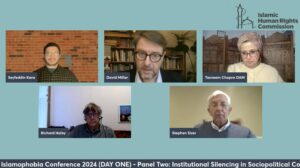
From the early hours in Melbourne, Australia, we were joined our second keynote speaker, Tasneem Chopra.
Tasneem Chopra shares her personal ordeal of being doxed and targeted by a year-long smear campaign led by three white Zionist men to silence her critique of the genocide in Gaza, which profoundly impacted her livelihood and well-being. Tasneem ultimately had to resign from two statutory board roles that she occupied for several years:
“It would seem that stepping outside the parameters of an acceptable model minority, I wrought havoc upon my reputation in the public realm in my capacity as a diversity advocate. Voicing my concerns for human rights transgressions did not coalesce with the requirement of keeping quiet about my discomfort when these transgressions impacted an ‘otherised’ cohort. This has borne significant costs to me mentally, emotionally and financially.
Negotiating the horrors we see whilst attempting to engage in gainful employment, is a privileged discomfort we work through with varied results. In my case, as a free-lance Consultant working in the space of Intersectionality and Leadership, my awareness of global injustices has long influenced my work praxis. I live and work on land that was never ceded by Indigenous Australians, as the British brutally colonised “Terra Nullius”. I was born in Kenya, a nation which also endured colonial rule of the British, as did my ancestors from India. I am hard wired to recognise and respond to the impact of imperial aggression and know when to call it out.
Like millions of Australians and those around the world, I took to social media; it became a platform in which I would describe it as a frequent sight of pain. Within the space of a minute, I’d witness a mother cradling her dead child then I’ve seen IDF reservist mockingly brandishing a Palestinian child’s toy, looted from home that blew up, then read about a medic shot in the head by an IDF drone.”
Tasneem highlights how her advocacy for human rights was mischaracterised as anti-Semitism, exposing her to widespread public attacks, beginning with a LinkedIn exchange in November 2023, where she had commented on Senator Mehreen Faruqi’s (Deputy Leader of The Greens in Australia) critique of Israel’s extreme response in Gaza. Even after blocking ‘Person A’ (one of three the individuals that targeted and harassed Tasneem), he had preceded to profile her in discussion with all of his followers as an unreasonable antisemite supporter of Hamas, discrediting her qualifications and integrity. Within weeks she was a recipient of hate mail and attacks.
“Actions against me ranged from hate mail, a petition to have my OAM revoked, to three hit pieces in national papers triggered by an amateur journalist, Person B, a formal complaint to the Australian Human Rights Commission followed by a formal investigation by the Victorian government to have my board appointments cancelled, by Person C, a Zionist lawyer in Melbourne. In the space of six months, my life was turned upside down.
The misogyny and racism I am experiencing as a direct result of these actions from complete strangers has been terrifying and has taken an unprecedented toll on my health and well-being.
Collectively, these three middle-aged, educated, affluent, white Zionist men are working together to deplatform me. The power dynamics, the misogynistic and racist leanings of this coordinated assaults are heinous and they constitute what I feel to be a form of gendered and racial violence.
I am low hanging fruit and an easy target to the sheer optics of this aggression is not lost on me and the lack of systemic support only reinforces my assessment.
While my smear campaign has caused me personal terror I realised that I’m in putting amazing company when I look around the country and see who else is being targeted specifically the type of the trend of people that these men are pursuing to silence include successful Australian Arab and Muslim women who occupy a platform again of some sort. the transgressions they experienced have ranged from doxing defamation silencing and motions to have contracts terminated and in every case these attacks have come from members of the Zionist community.
I am furious for the Muslim women and WOC activists I speak to who continue to be expended like point scoring props by institutions who see only extractive value from our presence and zero substantive worth. When the very attributes for which I was retained became the reason I was investigated, this was a moment of absolute clarity. I saw how systems and people that platform diversity whilst engaging in silencing and stealthily maintaining racist structures become the embodiment of faux allyship.”
Panellists for this session included Reverend Stephen Sizer and Richard Haley.
Reverend Stephen Sizer expressed his sympathy to both David and Tasneem for the difficulties they have endured for speaking out against injustice. Additionally, Revd. Sizer discussed the strategies used by Zionists to silence criticism of Israel and advocated ways to resist these tactics. He identified five key strategies: ingratiation, intimidation, isolation, incrimination, and assassination.
“For me personally, as a as a young clergyman, the temptation was to go to Israel on all expenses paid tours, familiarisation tours, as they call them, run by the Israeli ministry of tourism and in which you imbibe the Israeli script… You go to Masada to see how they withstood the Roman Empire… They take you to the Western Wall to kibbutz to show how the land is being turned from a desert into a land flowing with milk and honey. They will give you free maps which won’t show any international borders, and they will warn you in subtle ways not to have anything to do with the Palestinians, they are terrorists, or they are thieves that so on.
If the ingratiation doesn’t work, they move to the second level which is intimidation. They will intimidate you if you write articles, if you speak at conferences. For me it’s anonymous phone calls, emails, letters, and articles critical of things you have written or said. You begin to be aware that there is a shadow behind you, there are people observing you, targeting you and putting pressure on you, in the hope that you will change the subject, leave Palestine behind. You will be intimidated the point where you shut up. I experienced that over at least a decade… it was almost a daily onslaught.
If intimidation doesn’t work, if you are tenacious, persistent and you won’t give in, then it moves to a third level: isolation. That is what both David and Tasneem have experience and I, along with many others, have experienced. Isolation in the sense that they will intimidate others in order to isolate you. So, the intimidation is directed at the institution we work for, the church organisation, the charities we are involved with. They are intimidated and pressure is put on them, possibly threats of funding would be withdrawn.
If isolation doesn’t work, [although] it usually does, it moves to a fourth level which is to incriminate, involving bringing the police and the judicial authorities to bear. This is where guilt by association with other speakers of a conference, for example… by implication you are complicit or if someone accused of anti-Semitism and you associate with them, you must be complicit too.
If incrimination doesn’t work, then you have the final level which is assassination. We only have to think recently individuals have been assassinated in Gaza, Lebanon, Syria and Iran even.
Zionists very rarely directly confront us, they very rarely reveal their colours; they will do it through others who are given leverage if you like, so they will use Jewish leaders and religious leaders to put pressure on Christian leaders in order to discipline a recalcitrant rebellious priest, for example. The Jewish leaders will warn Christian leaders that ‘so-and-so persons is involved in anti-Semitism, and it makes us feel very uncomfortable, we can’t associate with you unless you discipline them’. In David’s case, it was a Jewish student that was not even one of his students making a complaint about something he said or posted, which was sufficient to get the university authorities panicking and involved in the process that led to his dismissal.”
During a disciplinary procedure in the Church of England, Jeremy Corbyn defended Revd. Sizer against allegations of anti-Semitism, joining nearly 100 others in support. Later, as Labour Party leader, Corbyn’s association with Revd. Sizer was exploited in the smear campaign against Corbyn, with outlets like The Daily Mail falsely accusing him of associating with Holocaust deniers to undermine his credibility.
Revd. Sizer also critiqued the IHRA definition of anti-Semitism, highlighting that it is deliberately vague and weaponised to suppress legitimate criticism of Israel’s policies. He stressed the importance of discrediting this definition and pushing for clear distinctions between racism and political critique.
Richard Haley began by expressing full solidarity with individuals facing silencing and repression, such as those protesting against the Gaza genocide in Edinburgh and Glasgow, as well as activists enduring state silencing through police and legal pressure.
Haley notes that activists often face pressures not only from overt opposition but also from their own networks, including political parties, community groups, and interfaith organizations, which can make them reluctant to speak out due to fears of losing support or causing divisions.
Despite acknowledging that white activists are not immune from silencing, Haley stresses the importance of recognising the racialised nature of the dynamics of racism and Islamophobia. Furthermore, he critiqued “citizen McCarthyism” and the privatisation of silencing tactics, such as the actions of organizations like UK Lawyers for Israel, which exert influence on venues hosting pro-Palestine events.
“It’s not just about cancellations—it’s about these particular cancellations gaining a sort of extra-legal authority.”
Haley also urges activists to support those on the front lines, ensuring they are not left vulnerable or unsupported, and to put pressure on allies and organisations to take more responsibility in the fight against silencing.
“We in our movement should be making sure that the people on the front lines can’t be treated as low-hanging fruit.”
Day two of the 2024 Islamophobia Conference took place online and in-person at the P21 Gallery in Euston.
Watch Day Two here:
We commenced with a recitation, by Anwar Saleem, and translation of the Qur’an (Surah Baqarah, verses 153-157), followed by an introduction to the theme of the conference and a recap of day one panels by Saeed Khan.
Panel Three: The Culture Paradox of Muslim Representation on Social Media
Kaneez introduced the speakers and shared her thoughts on the panel’s theme: social media and the online environment of hate, particularly the targeting of visibly Muslim women. She highlighted how, in the digital world, trolls from across the globe can reach us, even from the comfort of our own homes.
Unfortunately, Professor Ilan Pappé could not join us on this occasion. However, we had the privilege of hearing Saeed Khan’s insightful commentary on the topic.
Saeed talked about how social media leverages itself with traditional forms of communication and Muslim representation, with a focus on the American context.
“We find in the US a paradigm shift that is now accelerating when it comes to the issue of expression. There was the support level of the first amendment–I said that in the past tense because it is uncertain, with no sense of hysteria or paranoia whether the values of the first amendment are still going to be maintained the fidelity tht most americans felt was a presumption upon which they could proverbially go to sleep well at night and expect to protect them and defend them afterwards when they woke up in the morning.”
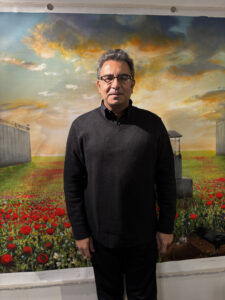
He discussed the brutality in Gaza, Palestine:
“Gaza has served as a stress test for western liberal democracies to assess whether or not they are willing to and committed to uphold the values that they have used to define themselves and distinguish themselves from other societies”.
He analysed the threats to criminalise activities like peaceful protesting in the UK, France, Germany and elsewhere in Europe and suggestions of violation of arbitrary policies, such as denaturalisation and how these developments were not replicated in the U.S. Saeed suggests however that it may occur now since the election of Donald Trump as he challenges the notion of birthright citizenship and the fourteenth amendment.
He also discussed a short history on protesting and expression, and now the subsequent silencing on university campuses, doxing at university campuses, and examples of public sectors getting involved with private sectors, and Tasneem Chopra’s smear campaign which impacted her financially, her reputation and health.
The panellists for this session featured Myriam Francois and Malia Bouattia.
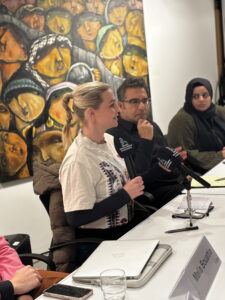 =
=
Myriam Francois reflects on her unexpected rise to prominence after a Sky News interview went viral, catapulting her social media following from 10,000 to over a quarter of a million, almost overnight. This rapid exposure brought intense scrutiny, diverse reactions, and assumptions about Myriam’s identity based on her posts. She underscores that her use of social media is primarily to share her worldview as a journalist and filmmaker, whilst also acknowledging the dual nature of social media as a tool for expression and a mechanism for data collection and consumer profiling.
“I fully recognise that social media was never created with the purpose of political organisation; let’s not be delusional, when we are on social media, we are the products to be consumed. Data or analytics, everything that we put out forms a precious body of data that is sold to companies in order to be able to better profile us. Principally the private sector; which shampoo brand is going to be right for you and which makeup is more likely to be the one that you purchase. But of course I’m sure much more nefariously, in the last 15 months, we shouldn’t be under any illusion that although social media appears to be a space where we are organising, where we are sharing information that we think is of use to the broader movement that many of us are involved in, [it] is also clearly a space where we’re being watched very closely, where we are being profiled and where information is being gathered on us, on our connections, on who we share with, and whose posts, what we encouraging or not encouraging people to do.”
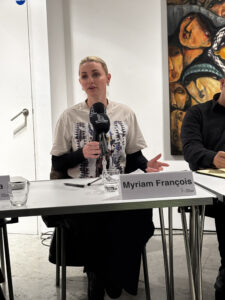
Myriam discusses Muslim representation on social media by consumer brands:
“We are perceived first and foremost as consumers and that’s reflected for us as Muslims in the fact that we are thrown a few crumbs that many of us lap up, as the face of Dove or as new models on the face of Vogue, oh how diverse that Vogue now has a hijabi model… I’m thrilled for the people in question because they should get paid and they are getting paid, but in the broader struggle of what it is that we are engaged with, it is in effect the cover for the most effective way of masking real forms of ideological diversity is through the veneer of physical diversity”.
Myriam also discussed the diminished presence of Muslim voices in both legacy and social media, highlighting how expressing political views rooted in Islamic frameworks invites immediate backlash, cautions against overestimating social media’s impact, and the need for investments in media to counter prevailing narratives.
Malia Bouattia began with expressing thanks to IHRC “for always providing this annual incredibly crucial and urgent space… for almost two decades of my activism [and] continuously doing the work that is necessary, but certainly never popular facing everything from shadow banning to being targeted by Zionists and the far right, I’m honoured to be here with you all today.”
“Allah yarhum the Palestinian martyrs, may we remember them and their plight in everything that we do, in every attack that we face and recognise just exactly what they are up against. May they obtain their liberation and justice against all the odds inshaAllah.”
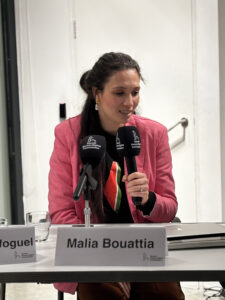
Malia describes social media as a double edged sword in particular with the genocide: “a live-streamed mass massacre”. She explains that it has benefited the struggle through highlighting the hypocrisy of the world’s leaders, and within institutions, within the private sector and so on.
Whilst also giving people an outlet and a space to articulate the anger and rage, Malia reflects that we have been able to archive the horrors and the crimes of Israel with an inability of the occupying force to control that:
“It cannot delete every single post, it cannot undo every TikTok, it cannot remove every video, every tweet, every single trace of what has happened and what the Palestinians have been recounting to the outside world, as hard as it may try.”
“[Social media] certainly allowed for a space of such horrific graphic content that at times we’ve been unable to ignore, and brought people over and removed them out of this deluded bubble of being depoliticized. It has also on the other hand, desensitised so many that we find ourselves scrolling through this graphic content thinking, ‘we know the struggle, we support the Palestinian people’, but we continue with our daily lives, not understanding that solidarity has to translate into action, particularly as we consider the luxury and comfort and relative safety that we live in, here in the West.
The idea of taking action could be as minimal as speaking to people, it may be considered an old-fashioned political tool, but it remains incredibly relevant… speaking to people, engaging within union spaces and our workplaces… Conceiving of solidarity campaigns, like BDS, as more than just what we stock in our fridges and cupboards, to thinking bigger, thinking about our local councils, our workplaces, our government, the services we access, and thinking about what our institutions are complicit in.”
She discusses the importance of developing networks, especially in spaces like protests, where there is huge diversity of people from all walks of life and backgrounds, which provide opportunities to network and amplify the support and liberation of Palestinians. She also mentioned the wider purposes of developing networks, such as bringing support for those who have lost their jobs, have had their reputation compromised and have been affected financially, especially given the impact of the Zionist lobby.
Panel Four: Pathways Forward: Strategies to Reclaim Civil Rights in Liberal Democracies
The fourth and final panel consisted of keynote presentations from Laurens de Rooij and Sadek Hamid, followed by commentaries from Asa Winstanley and Ramón Grosfoguel.
With a focus on Muslim representation in media, Laurens de Rooij explores the complexities of societal change when the goal is for meaningful and lasting change to take place. He addressed the psychological and emotional challenges that arise when confronting narratives about Muslims, noting how portrayals oscillate between isolated incidents and universalised stereotypes. Change, he argues, is inherently discomforting, requiring societies to question their identities and values while grappling with deep-seated fears of difference.
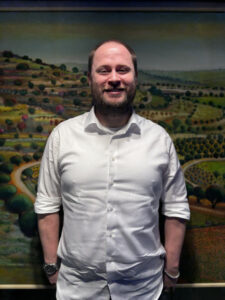
Laurens examines the role of media institutions in constructing and perpetuating these narratives of Muslims in ways that amplify stereotypes and polarise public discourse. He emphasised how these dynamics are also influenced by the economic and technological incentives that prioritise consumer engagement over nuanced storytelling. He concludes and advocates for gradual, multifaceted discursive change to challenge entrenched memories and stereotypes shaped by colonial legacies, emphasising the need to embrace discomfort to navigate the paradox between media’s simplicity-driven narratives and the complexity of societal issues.
“Change is discomfort—it’s hard, it’s difficult, it makes us question who we are, where our history is, what our society looks like, and what we want it to be, but the problem is that many societies are built on deep-seated psychological fears of difference.”
“Collective memories are not things we think about or have an opinion on; rather, they form the basis for everything we do, defining how we interact with other people—and if those collective memories have been built on centuries of empire and colonialism, it’s not difficult to imagine that this is probably the angle from which many people understand Islam and Muslims.”
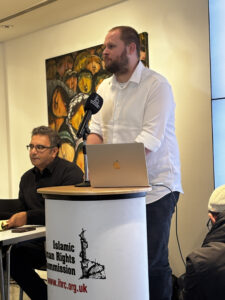
Sadek Hamid shared a personal example of being on the receiving end of a coordinated islamophobic attack, which had occurred five years ago. He was one of the academics commissioned by the then government to write about manifestations of Islamic activism, on mapping Islamist movements in the UK. He had written the paper and was also launching one of his books at the IHRC bookshop. The day after he presented the book with his colleague, he received a call from an infamous Sunday Times writer, followed by an e-mail from Sara Khan, the counter extremism commissioner, asking Sadek why he had been at the IHRC and why he had provocative statements around the Prevent programme. This triggered a series of events where essentially people tried to “cancel” him. As well as his appearance at IHRC, Sadek had retweeted a couple of posts that were deemed highly offensive, one of which was an article written by Asa about the Community Security Trust.
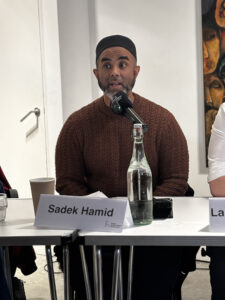
Sadek shared how difficult the ordeal was, but thankfully, the attempt to damage his reputation and to silence him was ultimately unsuccessful, as he had dozens of fellow academics and other individuals expressing support.
“It really does make you wonder what is happening to freedom of expression, the one of the kind of hallowed British values that we’re all supposed to bow down to. What happened to objectivity and our ability to just speak our minds? The environment and the direction that we’re going is extremely dangerous”.
“There needs to be a re-thinking in terms of the approaches both Muslim community organisations are taking and anybody who is working on Islamophobia. Generally, we must reassess our strategies and evaluate critically how impactful we can be because clearly, we are having an impact but if we are really honest, I think we can do a lot better.”
Sadek concluded with urging for an evaluation of successes as organisations to form new strategies to challenge Islamophobia, highlighting that the research, scholarship and literature around Islamophobia is aplenty and new approaches are needed.
Saeed responded:
“I don’t think Muslims are immune from being Islamophobes themselves… there’s an internal Islamophobia which deploys itself along political lines and those who take certain perspectives, whether it’s on a political issue or even a social issue, run the risk of a kind of excommunication, ostracisation or cancellation which if were done by anybody else would be considered garden variety Islamophobia. We have some brothers from the Jewish community here who I’m sure probably similarly face indictments of anti-Semitism, simply because they take a perspective that goes antithetical to certain current and perhaps more historical political realities within the discourse of that community.”
Asa Winstanley discussed the media perspective as a journalist, emphasising the importance of independent, reader-supported journalism, asserting that it is essential for enacting societal change. He critiques the legacy media—defined as entities like Sky News, the BBC, and the Daily Mail—for perpetuating negative discourses, particularly Islamophobia and pro-Israel narratives, while acknowledging that these narratives can lack public trust, prompting audiences to seek alternative media sources.
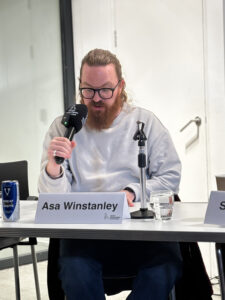
Despite the mistrust of legacy media, Asa highlights its continued dominance and alignment with state policies, pointing the pro-Israel lobby’s increasing influence over British media and citing examples of journalists being dismissed for opposing dominant narratives. He noted the growing visibility of the realities in Gaza through social media, underscoring the need to build independent media organizations to counteract biased narratives and report the truth, such as The Electronic Intifada.
He also mentioned legacy media’s persistent ability to shape narratives, as seen during the media’s portrayal of Jeremy Corbyn as antisemitic, despite a lack of substantial evidence, and how it significantly influenced public perception and played a role in preventing him from becoming Prime Minister.
Lastly, Asa addressed Islamophobia as a structural issue rooted in state policies designed to divide and control populations. He argued that Islamophobia, like other societal divisions, is not incidental but strategically employed, often supported by the Zionist movement’s influence within the British state.
Ramón Grosfoguel shared his thoughts on Syria as an example of fake news and double standards. He criticised the pattern of celebrating regime changes, only for these countries to fall into chaos, sectarianism, and exploitation, stressing the role of historical amnesia in enabling public complicity with imperialist agendas.
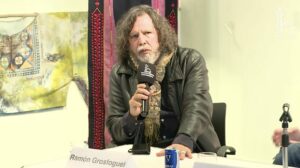
Ramón concludes with a call to address the political consciousness of Western population and the need to combat historical ignorance, which blinds people to the repeated failures and destructive motives of foreign interventions. Furthermore, he challenges listeners to resist the normalisation of media propaganda that fuels imperialism.
The panel concluded with a Q&A with the audience and a summary of the discussions by Raza Kazim. The conference came to final close with a vote of thanks by Massoud Shadjareh, Chair of IHRC. He talked about the inception of IHRC by a group of activists and realising that one of crucial things they were going to be facing was addressing and decreasing Islamophobia.
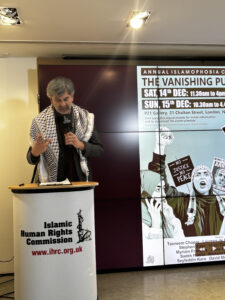
They launched the first report on Islamophobia at the House of Lords in 2001, as a Muslim organisation; ever since then they have been tackling and collecting research on this issue, with quantitative and qualitative data, from Britain, France, Germany, the United States, Canada, and Austria. Shadjareh recalls Jack Straw saying in 2001, that he was not convinced that Islamophobia exists, and now, Shadjareh highlights, Islamophobes acknowledge that Islamophobia exists. Such individuals and institutions insist that it is Muslims themselves that are at fault for not reforming or assimilating enough.
“We have exposed the environment of hate which has been created by politicians and the media, where every ordinary person of a targeted group becomes hated… hate always preceded ethnic cleansing and genocide. I have to say that we are worried, we are thinking ‘how could this happen?’, but we are now warning that we are on that route”.
Massoud Shadjareh urged people to join together, create institutions and empower the whole community, highlighting that it is not just Muslims that will be victims of this environment of hate, but that the whole society pays a price for Otherisation.

